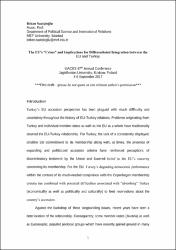Please use this identifier to cite or link to this item:
https://hdl.handle.net/20.500.11779/457Full metadata record
| DC Field | Value | Language |
|---|---|---|
| dc.contributor.author | Saatçioğlu, Beken | - |
| dc.date.accessioned | 2019-02-22T13:40:33Z | |
| dc.date.available | 2019-02-22T13:40:33Z | |
| dc.date.issued | 2017 | - |
| dc.identifier.citation | Saatcioglu, B. (September 4-6, 2017). The EU’s “Crises” and implications for differentiated integration between the EU and Turkey. University Association for Contemporary European Studies (UACES) 47. Annual Conference. [Jagiellonian University, Krakow, Poland] | en_US |
| dc.identifier.uri | https://hdl.handle.net/20.500.11779/457 | - |
| dc.identifier.uri | https://bit.ly/2TdoXeU | - |
| dc.description.abstract | The EU-Turkey relationship is in doldrums. Factors taking shape at various levels have imperiled Turkey's membership prospect to an unprecedented degree, with the result being that neither side believes in its realizability. This paper investigates how internal EU developments have recently come to bear on Turkey's EU accession process. It argues that the EU's many "crises" and possibility of disintegration brought to the fore by Brexit necessitate a realistic reconceptualization of the EU-Turkey partnership. First, the paper evaluates the EU's refugee crisis and the populist shockwaves it has triggered across Europe. While the management of the crisis boosted Turkey's value for the EU as a critical cooperation partner, anti-immigration and anti-EU rhetoric have gained pace among populist forces within several EU member-states as a reaction to refugee inflows. The paper assesses the implications of these multiple factors for the future shape of EU-Turkey relations. Second, it analyzes Brexit as a game-changer showing that EU membership can be set aside in favor of possibly new forms of interaction/cooperation with the EU. In this respect, the paper discusses the extent to which the evolving status of EU-Britain relationship can serve as a model for the strained EU-Turkey relations. It concludes that just like it is under way with Britain, Turkey-EU relations too can be negotiated as a mutually beneficial, functional partnership including, inter alia, a revitalized EU-Turkey customs union and cooperation in joint issue-areas such as migration. | en_US |
| dc.language.iso | en | en_US |
| dc.relation.ispartof | University Association for Contemporary European Studies (UACES) 47. Annual Conference | en_US |
| dc.rights | info:eu-repo/semantics/openAccess | en_US |
| dc.subject | "Crises" | en_US |
| dc.subject | EU's "Crises" | en_US |
| dc.title | The Eu’s “crises” and Implications for Differentiated Integration Between the Eu and Turkey | en_US |
| dc.type | Conference Object | en_US |
| dc.authorid | Beken Saatçioğlu / 27364 | - |
| dc.authorid | Beken Saatçioğlu / 0000-0002-1650-5332 | - |
| dc.relation.publicationcategory | Konferans Öğesi - Uluslararası - Kurum Öğretim Elemanı | en_US |
| dc.department | İİSBF, Siyaset Bilimi ve Uluslararası İlişkiler Bölümü | en_US |
| dc.institutionauthor | Saatçioğlu, Beken | - |
| item.cerifentitytype | Publications | - |
| item.openairecristype | http://purl.org/coar/resource_type/c_18cf | - |
| item.openairetype | Conference Object | - |
| item.languageiso639-1 | en | - |
| item.grantfulltext | open | - |
| item.fulltext | With Fulltext | - |
| crisitem.author.dept | 04.04. Department of Political Science and International Relations | - |
| Appears in Collections: | Siyaset Bilimi ve Uluslararası İlişkiler Bölümü Koleksiyonu | |
Files in This Item:
| File | Description | Size | Format | |
|---|---|---|---|---|
| Saatcioglu_2017_UACES_konferansi_bildiri.pdf | Yazar Sürümü_Bildiri Dosyası | 523.97 kB | Adobe PDF |  View/Open |
CORE Recommender
Page view(s)
22
checked on Nov 18, 2024
Download(s)
10
checked on Nov 18, 2024
Google ScholarTM
Check
Items in GCRIS Repository are protected by copyright, with all rights reserved, unless otherwise indicated.